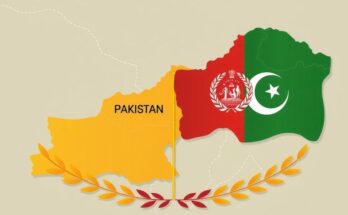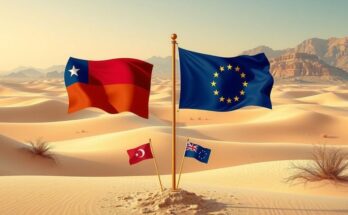DRC President Félix Tshisekedi and Rwandan President Paul Kagame have called for an immediate ceasefire in eastern DRC following direct talks in Qatar, after intense fighting in the region. The commitment to peace comes amid accusations against Rwanda of supporting M23 rebels, which the Rwandan government denies. Although both leaders recognize the need for continued dialogue, the feasibility of a ceasefire remains uncertain due to M23’s previous noncompliance with peace talks.
In recent discussions held in Qatar, President Félix Tshisekedi of the Democratic Republic of Congo (DRC) and President Paul Kagame of Rwanda have jointly called for an immediate ceasefire in eastern DRC. This meeting marks the first direct interaction between the two leaders since the escalation of the M23 rebel offensive, which has resulted in approximately 7,000 fatalities since January.
The prospects for adherence to the ceasefire by the M23 remain unclear, particularly after the rebels declined to participate in peace talks held earlier in Angola. The DRC government has accused Rwanda of providing military support to the M23, a claim that both the United Nations and the United States have affirmed. However, Rwanda denies these accusations, asserting that its military actions are primarily defensive against DRC forces and allied militias.
Furthermore, the DRC has accused Rwanda of engaging in the illegal exploitation of its mineral resources, which Rwanda also contests. Last December, prior peace negotiations facilitated by Angola collapsed when Rwanda insisted on direct talks between the DRC and the M23, leading to the rebel group’s swift seizure of Goma and Bukavu.
During their meeting, as reported in a joint statement from Qatar’s foreign ministry, both leaders reiterated their commitment to an immediate and unconditional ceasefire. However, the mechanisms for implementation and monitoring remain ambiguous. The statement also highlighted the importance of continued discussions initiated in Doha for establishing a foundation for lasting peace.
This unexpected encounter reflects a shift, as previously the two presidents had maintained a more confrontational stance towards each other concerning the ongoing conflict. President Kagame subsequently emphasized the necessity of direct dialogue between DRC and the M23 to address fundamental conflict causes, stating that collaborative efforts could expedite progress. President Tshisekedi’s spokesperson noted that the Qatari emir, Sheikh Tamim bin Hamad Al Thani, played a significant role in initiating these talks, positioning Qatar as an essential ally for both nations.
Overall, this meeting is seen as an initial step towards forging a lasting peace in the conflict-ridden eastern DRC, especially in light of the failure of earlier attempts to unite the DRC government with M23 leadership for peace conversations. Notably, the rebels withdrew from earlier negotiations following the announcement of EU sanctions against their leaders.
The recent calls for an immediate ceasefire by DRC and Rwandan leaders signify a potential turning point in addressing the ongoing conflict in eastern DRC. Despite their differences, the cooperative dialogue initiated in Qatar may pave the way for future peace efforts. However, the situation remains delicate, and the commitment of all parties, including the M23, is critical for achieving a sustainable resolution.
Original Source: www.namibian.com.na




